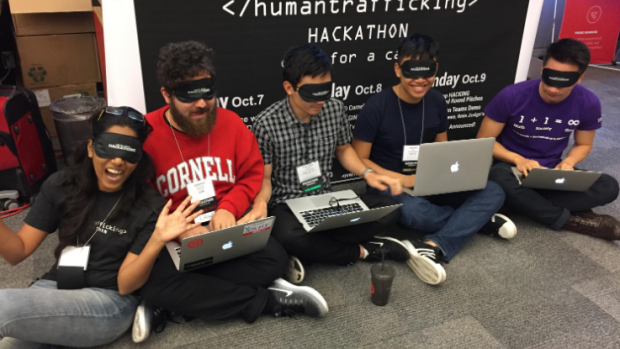Student hackers team up with Manhattan DA to fight human trafficking

In an ongoing effort to combat human trafficking in New York City and across the globe, the Manhattan District Attorney’s (DANY) office partnered with Cornell Tech for a 24-hour student hackathon in October. Students “hacked” public data to build tools that can help the DANY and other agencies in tracking and investigating human trafficking on the web. Computer science Ph.D. students from NYU Tandon participated in the hackathon, winning a second place prize for their project on labor trafficking.
The NYU Tandon team, known as Red Herring, was comprised of NYU students Gromit Chan, Tuan-Anh Hoang Vu, Kien Pham, and Aline Bessa, as well as Cornell Tech students Sindhu Babu and Johanan Ottensooser. “Unlike sex trafficking, labor trafficking cases usually do not have many strong and explicit indicators through data collected from the Web,” Pham said. “Our idea is to make use of public data relating to known labor-trafficking-involved companies to derive a list of indicators or features — we also call it red flags — for labor trafficking cases.”
By cross-referencing public data sets and online reviews of businesses, the team created a model that can detect companies with potential labor violations based on these known red flags. They also incorporated an interactive visualization tool that allows domain experts to easily input their own data to determine red flags and visually locate businesses committing these potential violations.
The hackathon paired the student teams with industry mentors. Yamuna Krishnamurthy and Aecio Santos, NYU Tandon research associates in the Visualization and Data Analytics (ViDA) Lab, were the Red Herring team’s mentors who provided guidance throughout the hackathon. Krishnamurthy and Santos work on the DARPA Memex project, which creates online search software for the open and dark web that aids in targeting human trafficking and other criminal activity.
Krishnamurthy and Santos explained the importance for the students, and researchers like themselves, to build tools and interfaces that accommodate the varying technical expertise of a domain expert or human trafficking analyst. Though crunched for time during the 24-hour event, the team’s project needed to be easily used by and translatable to many individuals. “The end users’ skill sets are very diverse,” Krishnamurthy said, “so we have to make sure that it caters to all these different experts.”
While comprised of mainly computer science students, the hackathon encouraged participation from students from other disciplines. Santos noted that one Red Herring team member is pursuing a law degree at Cornell Tech, which helped the team in learning “how to interact with people with different skills” as well as communicating their work to the other teams and the DANY investigators. For Pham, the hackathon was a rewarding experience, “not only because the problems are so encouraging to work on, but also the perspective brought by people from different backgrounds.”
Though Krishnamurthy and Santos acknowledged the difficulty of building a finished tool in 24 hours, Pham hopes that their “idea of the framework and the initial prototype can be a good start” for the DANY as they continue developing technology to aid their labor trafficking investigations.
Camila Ryder
Graduate School of Arts and Science
Master of Arts in English Literature, Class of 2018




